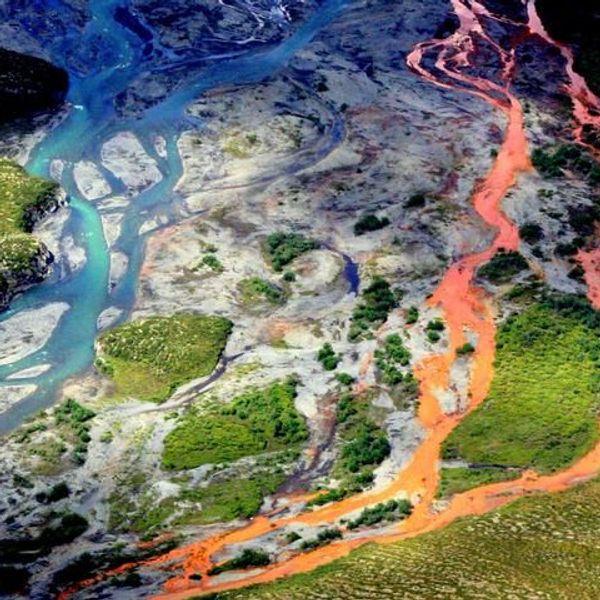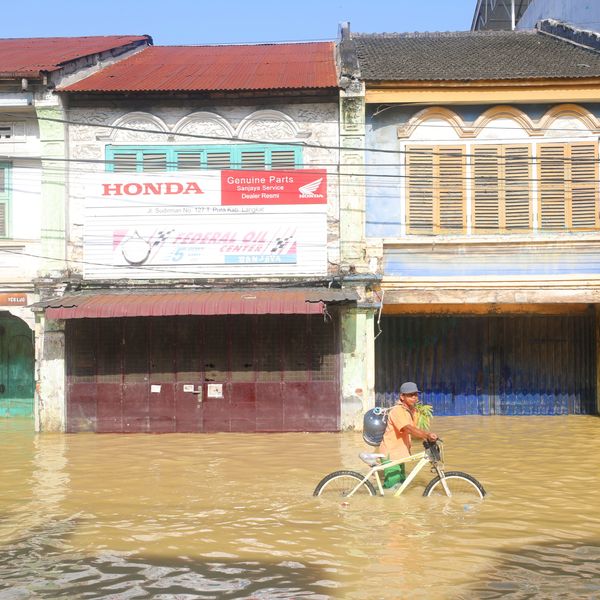Hotter and Wetter: Report Finds Global Warming Driving Extreme Weather
Rarest and most extreme weather events, which have the highest socio-economic and human impacts, will become increasingly familiar due to human-induced greenhouse gas emissions.
It's not just your imagination. The punishing heat waves, record snowfall, and 500-year floods, which seem to be occurring with increasing frequency, are doing just that, thanks to global warming.
According to a study (pdf) published Monday in the journal Nature Climate Change, these extreme weather events are clearly attributed to human-induced climate change and will only worsen as average temperatures tick higher and higher.
According to report authors Dr. Erich Markus Fischer and Reto Knutti, both with the Institute for Atmospheric and Climate Science at the Swiss Federal Institute of Technology Zurich, under present-day warming of 0.85deg Celsius, the likelihood of a "moderate hot extreme" occurring is 75 percent greater than in pre-industrial times.
However, because warming increases non-linearly, under the projected warming of 2deg Celsius--widely considered the threshold for the worst effects of climate change--the probability of a "hot extreme" is more than five times greater than current levels.
"This result," the authors note, "has strong implications for the discussion of different mitigation targets in climate negotiations, where differences between targets are small in terms of global temperatures but large in terms of the probability of extremes."
Furthermore, according to the study, roughly 18 percent of current precipitation extremes occurring worldwide are attributable to "anthropogenic," or human-caused, warming. This rises to roughly 40 percent under 2deg Celsius.
Put another way, an extreme precipitation event expected once every 10,000 days, or 30 years, in pre-industrial conditions, is expected every 10 to 20 years at 2deg warming.
While the study focuses primarily on daily events, the authors note that with increased warming, the probability of "5-day, 15-day, or 31-day temperature and precipitation extremes increase even faster with rising temperatures."
"People can argue that we had these kinds of extremes well before human influence on the climate--we had them centuries ago," the New York Times quoted Fischer as saying. "And that's correct. But the odds have changed, and we get more of them."
Commenting on the difficulty of attributing a particular weather event to human-induced global warming, the authors continue:
In a broader context, the approach here is reminiscent of medical studies, where it is not possible to attribute a single fatality from lung cancer to smoking. Instead, a comparison of the lung-cancer-related mortality rate in smokers with the rate in non-smokers may allow attribution of the excess mortality to smoking. Likewise, no single weather event exclusively results from anthropogenic influence in a deterministic sense but arises from complex interactions of atmospheric dynamics, local boundary layer and land-surface interaction and potential anomalous sea-ice and ocean conditions. Warmer temperatures may influence some of those factors and favour extreme events to happen, and thus the probability of such events increases because of warming.
In fact, it is the "rarest and most extreme weather events"--which the study notes typically have the "highest socio-economic impacts"--that will become increasingly familiar due to human-induced greenhouse gas emissions.
An Urgent Message From Our Co-Founder
Dear Common Dreams reader, The U.S. is on a fast track to authoritarianism like nothing I've ever seen. Meanwhile, corporate news outlets are utterly capitulating to Trump, twisting their coverage to avoid drawing his ire while lining up to stuff cash in his pockets. That's why I believe that Common Dreams is doing the best and most consequential reporting that we've ever done. Our small but mighty team is a progressive reporting powerhouse, covering the news every day that the corporate media never will. Our mission has always been simple: To inform. To inspire. And to ignite change for the common good. Now here's the key piece that I want all our readers to understand: None of this would be possible without your financial support. That's not just some fundraising cliche. It's the absolute and literal truth. We don't accept corporate advertising and never will. We don't have a paywall because we don't think people should be blocked from critical news based on their ability to pay. Everything we do is funded by the donations of readers like you. Will you donate now to help power the nonprofit, independent reporting of Common Dreams? Thank you for being a vital member of our community. Together, we can keep independent journalism alive when it’s needed most. - Craig Brown, Co-founder |
It's not just your imagination. The punishing heat waves, record snowfall, and 500-year floods, which seem to be occurring with increasing frequency, are doing just that, thanks to global warming.
According to a study (pdf) published Monday in the journal Nature Climate Change, these extreme weather events are clearly attributed to human-induced climate change and will only worsen as average temperatures tick higher and higher.
According to report authors Dr. Erich Markus Fischer and Reto Knutti, both with the Institute for Atmospheric and Climate Science at the Swiss Federal Institute of Technology Zurich, under present-day warming of 0.85deg Celsius, the likelihood of a "moderate hot extreme" occurring is 75 percent greater than in pre-industrial times.
However, because warming increases non-linearly, under the projected warming of 2deg Celsius--widely considered the threshold for the worst effects of climate change--the probability of a "hot extreme" is more than five times greater than current levels.
"This result," the authors note, "has strong implications for the discussion of different mitigation targets in climate negotiations, where differences between targets are small in terms of global temperatures but large in terms of the probability of extremes."
Furthermore, according to the study, roughly 18 percent of current precipitation extremes occurring worldwide are attributable to "anthropogenic," or human-caused, warming. This rises to roughly 40 percent under 2deg Celsius.
Put another way, an extreme precipitation event expected once every 10,000 days, or 30 years, in pre-industrial conditions, is expected every 10 to 20 years at 2deg warming.
While the study focuses primarily on daily events, the authors note that with increased warming, the probability of "5-day, 15-day, or 31-day temperature and precipitation extremes increase even faster with rising temperatures."
"People can argue that we had these kinds of extremes well before human influence on the climate--we had them centuries ago," the New York Times quoted Fischer as saying. "And that's correct. But the odds have changed, and we get more of them."
Commenting on the difficulty of attributing a particular weather event to human-induced global warming, the authors continue:
In a broader context, the approach here is reminiscent of medical studies, where it is not possible to attribute a single fatality from lung cancer to smoking. Instead, a comparison of the lung-cancer-related mortality rate in smokers with the rate in non-smokers may allow attribution of the excess mortality to smoking. Likewise, no single weather event exclusively results from anthropogenic influence in a deterministic sense but arises from complex interactions of atmospheric dynamics, local boundary layer and land-surface interaction and potential anomalous sea-ice and ocean conditions. Warmer temperatures may influence some of those factors and favour extreme events to happen, and thus the probability of such events increases because of warming.
In fact, it is the "rarest and most extreme weather events"--which the study notes typically have the "highest socio-economic impacts"--that will become increasingly familiar due to human-induced greenhouse gas emissions.
It's not just your imagination. The punishing heat waves, record snowfall, and 500-year floods, which seem to be occurring with increasing frequency, are doing just that, thanks to global warming.
According to a study (pdf) published Monday in the journal Nature Climate Change, these extreme weather events are clearly attributed to human-induced climate change and will only worsen as average temperatures tick higher and higher.
According to report authors Dr. Erich Markus Fischer and Reto Knutti, both with the Institute for Atmospheric and Climate Science at the Swiss Federal Institute of Technology Zurich, under present-day warming of 0.85deg Celsius, the likelihood of a "moderate hot extreme" occurring is 75 percent greater than in pre-industrial times.
However, because warming increases non-linearly, under the projected warming of 2deg Celsius--widely considered the threshold for the worst effects of climate change--the probability of a "hot extreme" is more than five times greater than current levels.
"This result," the authors note, "has strong implications for the discussion of different mitigation targets in climate negotiations, where differences between targets are small in terms of global temperatures but large in terms of the probability of extremes."
Furthermore, according to the study, roughly 18 percent of current precipitation extremes occurring worldwide are attributable to "anthropogenic," or human-caused, warming. This rises to roughly 40 percent under 2deg Celsius.
Put another way, an extreme precipitation event expected once every 10,000 days, or 30 years, in pre-industrial conditions, is expected every 10 to 20 years at 2deg warming.
While the study focuses primarily on daily events, the authors note that with increased warming, the probability of "5-day, 15-day, or 31-day temperature and precipitation extremes increase even faster with rising temperatures."
"People can argue that we had these kinds of extremes well before human influence on the climate--we had them centuries ago," the New York Times quoted Fischer as saying. "And that's correct. But the odds have changed, and we get more of them."
Commenting on the difficulty of attributing a particular weather event to human-induced global warming, the authors continue:
In a broader context, the approach here is reminiscent of medical studies, where it is not possible to attribute a single fatality from lung cancer to smoking. Instead, a comparison of the lung-cancer-related mortality rate in smokers with the rate in non-smokers may allow attribution of the excess mortality to smoking. Likewise, no single weather event exclusively results from anthropogenic influence in a deterministic sense but arises from complex interactions of atmospheric dynamics, local boundary layer and land-surface interaction and potential anomalous sea-ice and ocean conditions. Warmer temperatures may influence some of those factors and favour extreme events to happen, and thus the probability of such events increases because of warming.
In fact, it is the "rarest and most extreme weather events"--which the study notes typically have the "highest socio-economic impacts"--that will become increasingly familiar due to human-induced greenhouse gas emissions.

